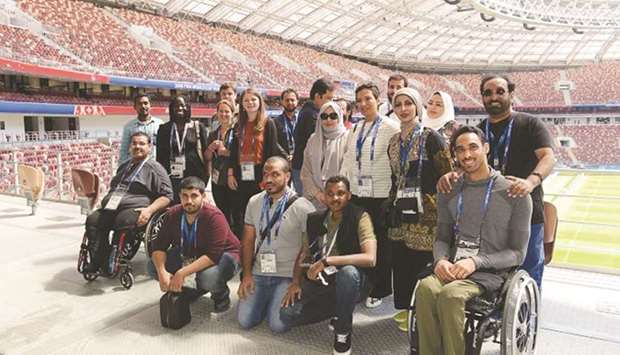Faisal al-Kooheji, chairman of Qatar Social and Cultural Centre for the Blind since 2014, has been a key figure in the Supreme Committee for Delivery & Legacy (SC)’s Accessibility Forum since its inception two years ago.
This summer, al-Kooheji was part of a 15-strong delegation comprising forum members who visited Moscow to observe accessibility features for fans with disabilities at the 2018 FIFA World Cup.
Al-Kooheji, who is registered blind, spoke to www.sc.qa to share his experiences of the tournament and look ahead to Qatar 2022.
l From an accessibility perspective, how would you describe your visit to Russia?
My stay in Moscow gave me an understanding of the accessibility features provided for football fans during Russia’s World Cup. It helped me put in perspective the measures required by Qatar as it strives to host an inclusive tournament in 2022.
I was impressed with the extensive accessibility features at Luzhniki Stadium. We were taken on a guided tour of the venue by FIFA and attended the Mexico versus Germany match there to get an idea of the complete fan experience.
lWhat were the main lessons learned from the trip?
I realised that the Russia 2018 Local Organising Committee was not involved in the planning for the provision of accessibility features. That role was played by FIFA consultants and the Centre for Access to Football in Europe (CAFE), the body providing consultation services to UEFA regarding the provision of an inclusive match-day experience for people with disabilities.
It was a wonderful learning experience to know the level of detail that had gone into CAFE’s planning. It was reassuring to experience that FIFA and UEFA respected their expertise.
In 2022, the SC will be directly driving the provision of accessibility elements and the level of detail will be higher because of the longer period of planning we will have benefited from.
lHow can Qatar ensure it offers a first-class experience for people with disabilities in 2022?
The Accessibility Forum has already made huge strides in planning for an inclusive tournament. With more stakeholders opening up their initiatives for evaluation, further progress will be achieved.
For example, Qatar Rail is a stakeholder of the Accessibility Forum and committed towards the provision of extensive accessibility features. I visited a Metro station in Moscow and found that accessibility features were not at the same level of excellence as in the stadium.
Even in the stadium, Qatar can deliver a greater level of detail. In Luzhniki Stadium, there were only two language options in the audio description device handed out to fans with visual disabilities – Russian and English. Qatar is planning to include at least three other language options in addition to Arabic and English in 2022.
Also, Qatar’s definition of the term disability is broader, including cognitive and intellectual disabilities in its scope.
l What are Qatar’s main challenges in the provision of accessibility services in 2022?
We are already past the stage when we faced our biggest challenge – which was creating social awareness. Thanks to the SC’s Accessibility Forum initiative, all key government and non-government bodies in Qatar are now steadfast in their commitment towards accessibility. It is now time to deliver.

The Accessibility Forum delegation in Russia.
